To achieve better sleep, start by setting a consistent sleep schedule. Go to bed and wake up at the same time daily, even on weekends. Create a sleep-conducive environment by keeping your room dark, quiet, and at a comfortable temperature of 60-67°F. Develop relaxing rituals like light stretching or deep breathing before bed. Manage stimulants by avoiding caffeine and nicotine in the afternoon or evening. Lastly, engage in regular moderate exercise during the day. Follow these tips, and you'll be well on your way to a restful night's sleep. More essential strategies await you.
Key Takeaways
- Maintain a consistent sleep schedule, aiming for 7-9 hours of sleep daily, even on weekends, to align with your body's circadian rhythm.
- Create a sleep-conducive environment by keeping the room dark, quiet, and at a comfortable temperature between 60-67°F (15-19°C).
- Establish relaxing sleep rituals, such as reading or deep breathing, to unwind and signal your body that it's time for sleep.
- Avoid stimulants like caffeine and nicotine in the afternoon and evening, and monitor your diet for hidden sources of stimulants.
- Engage in regular moderate-intensity exercise for at least 30 minutes daily, but refrain from strenuous workouts within an hour of bedtime.
Establish a Consistent Sleep Schedule
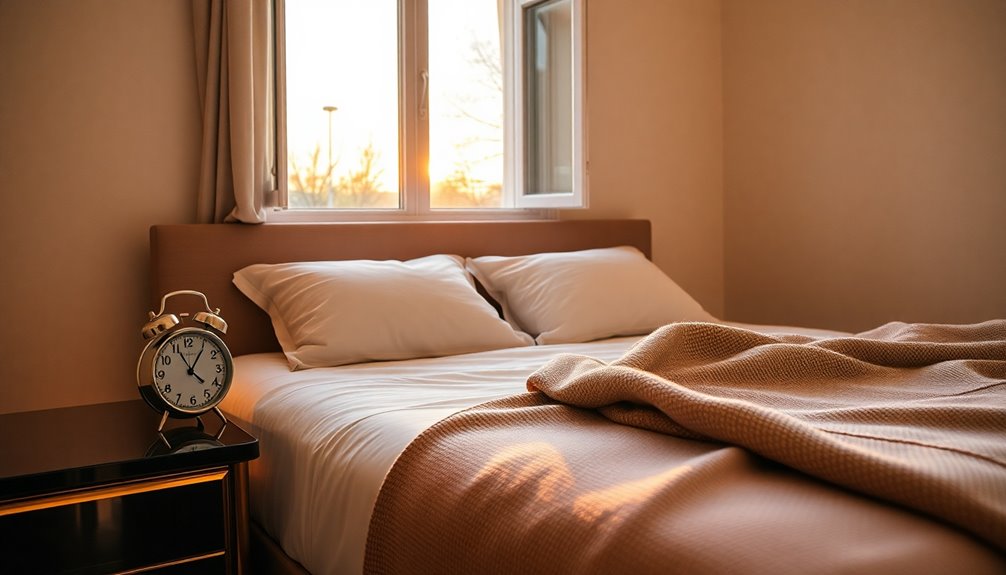
When you establish a consistent sleep schedule, you're not just following a routine; you're aligning with your body's natural circadian rhythm. This "master clock" regulates your physical, mental, and behavioral processes, ensuring you function at your best. Additionally, maintaining strong communication skills in your daily interactions can further reduce stress, contributing positively to your overall health.
Inconsistent sleep patterns can lead to confusion and sleep deprivation, impacting your overall health. By committing to a fixed bedtime and wake-up time, you can significantly lower your risk of mortality and improve your well-being. Irregular bedtimes correlate with insufficient sleep and poor quality, highlighting the importance of consistency.
Aim for 7-9 hours of sleep, even on weekends. Incorporate relaxation techniques and maintain good sleep hygiene to enhance your sleep quality. Supportive relationships can also play a crucial role in your ability to unwind and achieve restful sleep.
Over time, you'll notice lower stress levels, better moods, and improved focus, all contributing to a healthier, more productive life.
Create a Sleep-Conducive Environment

Creating a consistent sleep schedule lays the groundwork for quality rest, but the environment where you sleep plays an equally important role.
To promote relaxation, dim the lights in your room and avoid blue light from screens in the evening. Keep your room dark with light-blocking curtains, as too much light can disrupt your sleep. Aim for a comfortable temperature between 60-67°F (15-19°C) to enhance comfort. Additionally, consider using an air purifier to reduce allergens and improve air quality, which can further contribute to a restful night's sleep.
A quiet environment is essential, so consider using white noise machines or earplugs to mask unwanted sounds. Additionally, understanding environmental factors is crucial for restorative sleep. Finally, invest in a supportive mattress and pillows that suit your sleep position, and keep your bedroom clutter-free to cultivate a calming atmosphere.
These changes can make a significant difference in your sleep quality.
Develop Relaxing Sleep Rituals
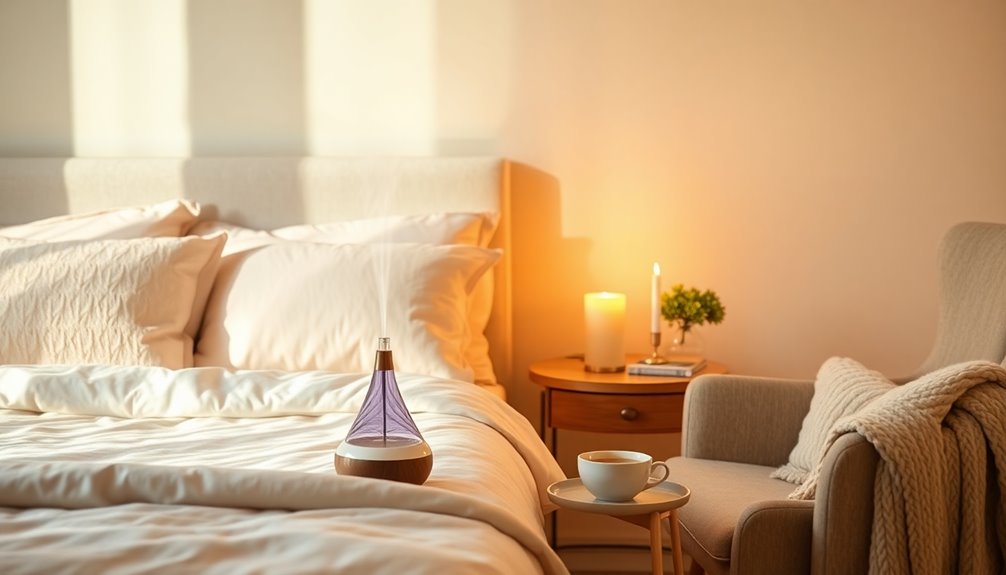
Establishing relaxing sleep rituals can significantly enhance your ability to unwind and prepare for a restful night.
Start a consistent nightly routine by dimming the lights and engaging in calming activities like light stretching or reading. Budget at least 30 minutes for winding down—unplug from electronics and practice deep breathing exercises, such as the 4-7-8 technique. Regular practice of relaxation techniques can not only improve your sleep quality but also reduce overall stress levels.
You might also try meditation or yoga nidra to ease anxiety. Incorporate soothing scents like lavender and take a warm bath to signal your body it's time for sleep.
Finally, keep a journal to jot down thoughts or gratitude, creating a peaceful mindset. These rituals will help you transition smoothly into a restful night.
Manage Stimulants and Substances
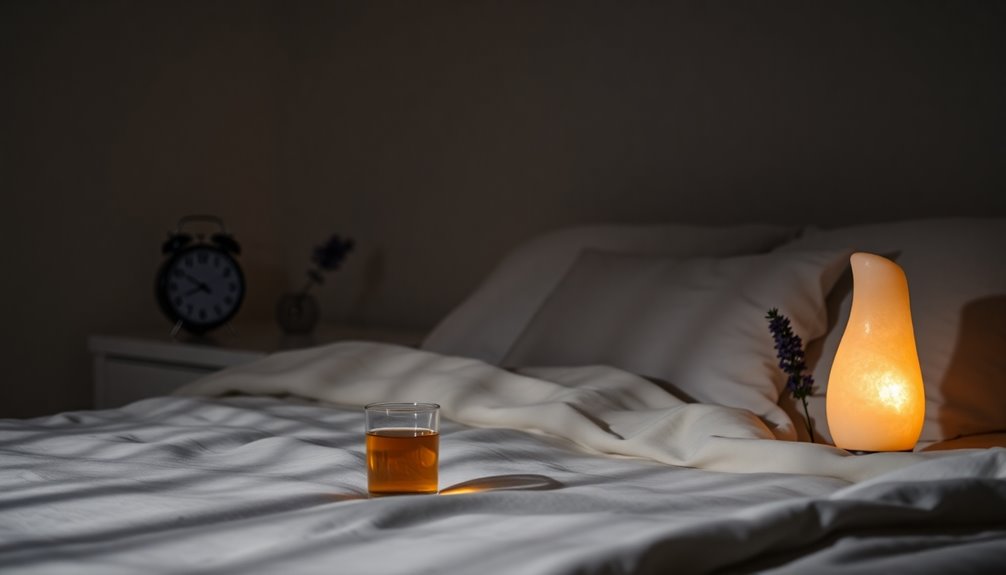
After cultivating relaxing sleep rituals, it's important to consider how stimulants and substances can impact your ability to rest.
Stimulants like caffeine, nicotine, and certain medications can disrupt your sleep-wake cycle, leading to insomnia and fragmented sleep. To improve your rest, avoid caffeine in the afternoon and evening, and be mindful of hidden sources like chocolate and energy drinks. Additionally, be aware that chronic abstinence from stimulants may result in persistent sleep disorders, making it crucial to manage your intake wisely. It's worth noting that some medications, such as decongestants, can also affect sleep quality, so it's important to discuss any concerns with your healthcare provider.
If you take prescription medications, discuss timing and dosage adjustments with your doctor.
Also, keep an eye on your diet; high sugar and low fiber foods can have a stimulating effect.
Regulate Physical Activity
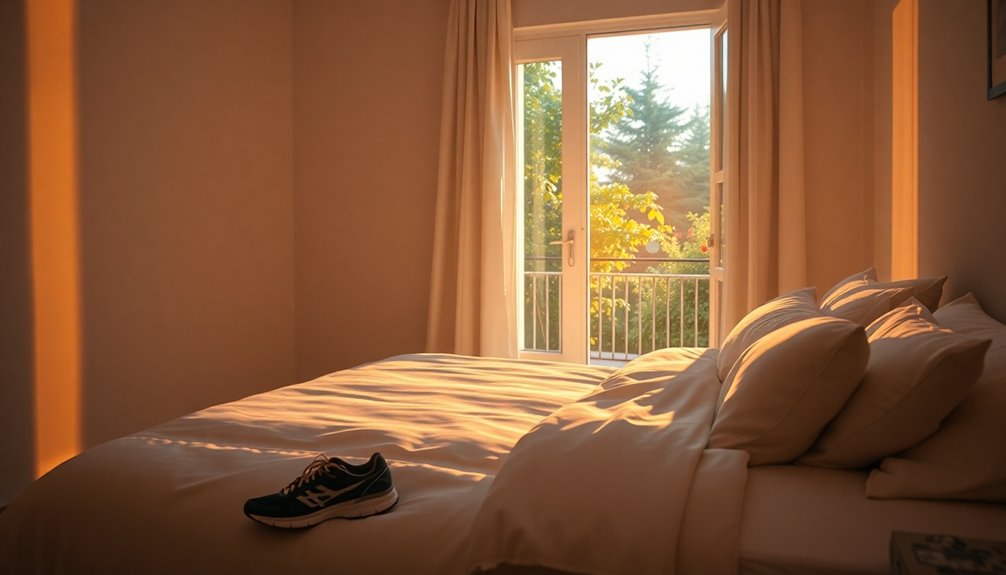
While you mightn't realize it, regulating your physical activity can significantly enhance your sleep quality. Engaging in regular moderate-intensity exercise helps improve both the duration and quality of your sleep.
It reduces stress and boosts melatonin production, which regulates your sleep-wake cycle. Aerobic workouts, especially in the morning, promote deep sleep and enhance your mood, creating a positive feedback loop to keep you active. Regular exercise significantly improves overall sleep quality and helps alleviate sleep disturbances. Incorporating regular exercise into your routine can also help manage stress effectively.
Aim for at least 30 minutes of daily exercise, but avoid strenuous workouts within an hour of bedtime to prevent sleep disturbances. Consistency is key; maintaining a regular routine over several weeks will yield better results.
Optimize Bed Usage
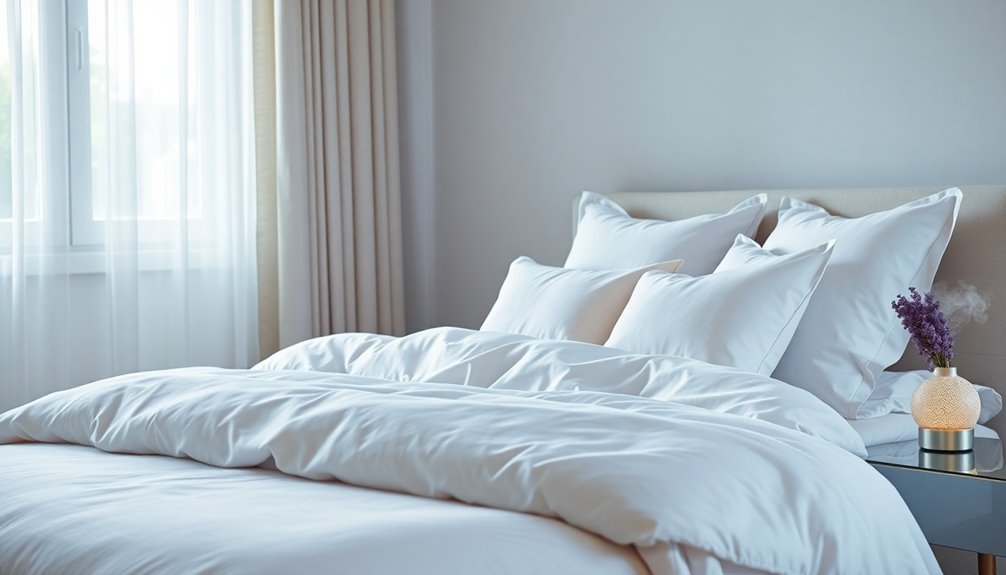
Your bed should be a sanctuary for sleep and intimacy, free from distractions. To reinforce this, limit activities in bed to just sleep and sex. Avoid watching TV, working, or scrolling through devices while you're there.
Keep your bed clutter-free, ensuring it's a comfortable haven with a supportive mattress and cozy bedding. Optimal sleep temperature is crucial, so consider adjusting your bedding or mattress to maintain a comfortable climate throughout the night. Additionally, maintaining a clean environment can contribute to better sleep, just as air purifiers can enhance air quality in your bedroom.
Consider your bed's placement, avoiding direct sunlight or noise disruptions. Disconnect from electronics at least an hour before bedtime, using features like silent mode to minimize interruptions.
Instead of screen time, engage in relaxing activities like reading or meditation. Finally, maintain a comfortable sleep environment with optimal temperatures and minimal light and noise to enhance your overall sleep quality.
Frequently Asked Questions
How Does Sleep Affect Mental Health and Mood?
Sleep profoundly affects your mental health and mood. When you don't get enough rest, you might notice increased anxiety, irritability, and frustration.
Even a couple of missed hours can dampen your positive feelings and heighten negative emotions. Sleep deprivation can lead to cognitive struggles, making it hard to cope with stress.
Conversely, anxiety and stress can disrupt your sleep, creating a cycle that harms your overall well-being. Prioritizing sleep is essential for emotional balance.
What Are the Long-Term Effects of Poor Sleep?
Poor sleep can lead to serious long-term effects on your health. You might face an increased risk of hypertension, diabetes, and obesity.
Mentally, you could experience heightened anxiety, irritability, and even depression. Your cognitive abilities may decline, making it tough to concentrate or remember things.
Additionally, your overall quality of life could diminish, leading to accidents and increased healthcare needs.
Essentially, chronic sleep deprivation can profoundly impact your daily functioning and longevity.
Can Napping During the Day Help or Hinder Sleep?
Napping during the day can help or hinder your sleep, depending on timing and duration.
A short nap of 20-30 minutes early in the afternoon can boost alertness and mood without affecting nighttime rest.
However, longer naps or those taken late in the day might lead to grogginess or disrupt your nighttime sleep.
It's important to listen to your body and find a napping routine that works best for you.
Are There Specific Foods That Promote Better Sleep?
Yes, certain foods can promote better sleep.
Try eating kiwis, fatty fish like salmon, and nuts such as almonds or walnuts before bed. Tart cherries and warm milk are great options too, as they contain sleep-promoting nutrients.
Incorporating high-glycemic index carbs, like rice, a few hours before sleeping can help you fall asleep faster.
Following a balanced diet rich in fruits, vegetables, and whole grains can also improve your overall sleep quality.
How Do Age and Sleep Needs Change Over Time?
As you age, your sleep needs change significantly. Newborns require a lot of sleep, while toddlers and preschoolers need less as they grow.
Teenagers typically need eight to ten hours, but often struggle with late bedtimes due to school demands. Adults generally need seven to nine hours, while older adults usually get by with around seven.
Understanding these shifts can help you adapt your sleep habits for better rest and overall health throughout your life.
Conclusion
By following these tips, you can transform your sleep experience and wake up feeling refreshed. Stick to a consistent schedule, create a cozy sleep environment, and develop calming rituals that signal it's time for rest. Keep an eye on your caffeine and alcohol intake, and make sure you're staying active during the day. Remember, your bed is for sleeping, so use it wisely. With these strategies, you'll be well on your way to achieving better sleep.









